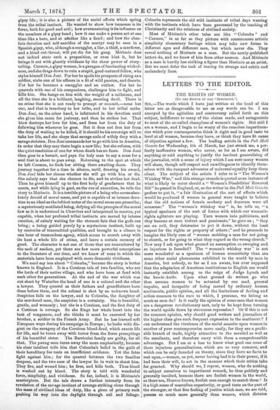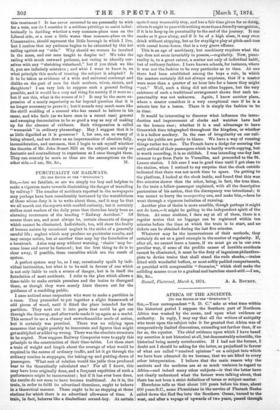LETTERS TO THE EDITOR.
THE RIGHTS OF WOMEN.
[To THE EDITOR OF THE " SPECTATOR."] SIR, —The words which I have just written at the head of this letter are as disagreeable to me as any words can be. I sin annoyed by the agitation and controversy called forth on this subject, indifferent to many of the claims made, and antagonistic to most of the so-called champions of women's rights. But still I am a woman, and I begin to be weary of the ceaseless impertinen- cies which your contemporaries think it right and in good taste to level at all women, because they have, or think they have fit cause of objection against a few. The leading article in the Pall Mall Gazette for Wednesday, 4th of March, has just struck me, a per- fectly inoffensive woman, who never, so far as I am aware, did anything or said anything to justify the insolent generalising of the journalist, with a sense of injury which I am sure many women will share, though self-respect and unwillingness to identify them- selves with the rampant advocates of universal equality keep them silent. The subject of the article I refer to is "The Women's Whiskey War," and this strange crusade is quoted as an instance of what is likely to occur should a " Women's Disabilities' Removal Bill" be passed in England, or, as the writer in the Pall Mall Gazette prefers to put it, "a fair illustration of the sort of effects which would be produced if women in general were taught to believe that the old notions of female modesty and decorum were all nonsense." The "women's whiskey war" is, he tells us, " a typical specimen of the sort of forces with which our women's- rights agitators are playing. Turn women into politicians, and they become at once violent and passionate," he goes on ; " they see an evil, they determine to put it down, without the least respect for the rights or property of others ;" and he proceeds to imagine the likely case of "women mobbing a man for not going to church, or for going to what they regard as the wrong church." Now may I ask upon what ground an assumption so sweeping and so injurious is founded? The " women's whiskey war is not more wonderful as a specimen of human eccentricity than are some other social phenomena exhibited to the world by men in America, but nobody, so far as I am aware, has ever supposed that the adaptation of American institutions to English use would instantly establish among us the reign of Judge Lynch and the bowie-knife. Upon what ground do writers go who thus assume women to be actuated by one mad, general impulse, and incapable of being moved by ordinary human sentiments, public opinion, and all the limitations of feeling and action common to the race to which, I presume, we belong as much as men do? Is it really the opinion of some men that women. are a dangerous revolutionary sect, only to be kept from turning the world upside down by strenuous repression? Or if this is not the common opinion, why should good writers and journalists of the higher class give such frequent expression to the sentiment ? I can understand the virulence of the social assaults upon women in another of your contemporaries more easily, for they are a profit- able branch of trade, highly attractive to the assailed as well as the assailants, and therefore carry with them a comprehensible advantage. But I am at a loss to know what good can come of these injurious generalisations, which are so very common, and which can be only founded on theory, since they have no facts to rest upon,—women, as yet, never having had it in their power, if it had been their will, to act in the manner which their critics take for granted. Why should we, I repeat, women, who do nothing to subject ourselves to impertinent remark, be thus publicly and generally insulted, because there are foolish women in the world, as there are, Heaven knows, foolish men enough to match them ? Is it a high sense of masculine superiority, or good taste on the part of the stronger, or that fine feeling of justice which men, we are told, possess so much more generally than women, which dictates this treatment ? It has never occurred to me personally to wish for a vote, nor do I consider it a sublime privilege to assist infini- tesimally in deciding whether a very common-place man on the Liberal aide, or a man a little worse than common-place on the Conservative, should represent the little borough in which I live, but I confess that my patience begins to be exhausted by this hot railing against my "side." Why should we women be insulted in the mass, and our sons taught to despise us? We take the railing with much outward patience, not caring to identify our- selves with any "shrieking sisterhood," but if you think we like it, you are infinitely mistaken ; and what I want to know is, on what principle this mode of treating the subject is adopted ? Is it to be taken as evidence of a wide and universal contempt and dislike on the part of men for their mothers, wives, sisters, and daughters? I am very loth to suppose such a general feeling possible, and it would be a very sad thing for society if it were so ; but if not this, what is the reason of it ? It may be the mere ex- pression of a manly superiority so far beyond question that it is no longer necessary to prove it ; but it sounds very much more like the shrill scolding of a counsel who has ceased to believe in his cause, and who feels (as we have seen in a recent case) general and sweeping denunciation to be as good a way as any of making up for the absence of evidence. Such vituperation is called " womanish " in ordinary phraseology. May I suggest that it is as little dignified as it is generous ? I, for one, am so weary of being abused, and set down as an impersonation of absolute folly, inconsideration, and unreason, that I begin to ask myself whether the theories of Mr. John Stuart Mill on the subject are really so fantastic and contradictory to experience as I once thought them. They can scarcely be more so than are the assumptions on the



































 Previous page
Previous page